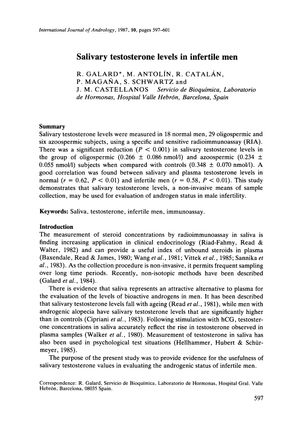TLDR Men with low or no sperm count have lower salivary testosterone levels, and saliva testing can measure their testosterone well.
In a study from 1987, researchers investigated salivary testosterone levels in a group of 53 men, which included 18 men with normal fertility, 29 with oligospermia (low sperm count), and 6 with azoospermia (no sperm). They found that men with oligospermia and azoospermia had significantly lower salivary testosterone levels, averaging 0.266 nmol/l and 0.234 nmol/l respectively, compared to the control group's average of 0.348 nmol/l. Additionally, the study demonstrated a strong correlation between salivary and plasma testosterone levels in both fertile and infertile men, with correlation coefficients of 0.62 and 0.58, respectively, both statistically significant with P values less than 0.01. The researchers concluded that measuring salivary testosterone is a viable non-invasive method to assess androgen status in the context of male infertility.
 29 citations
,
September 1983 in “British Journal of Dermatology”
29 citations
,
September 1983 in “British Journal of Dermatology” Men with hair loss have lower SHBG and higher saliva testosterone levels, suggesting increased androgen activity.
 151 citations
,
December 2004 in “Annals of the New York Academy of Sciences”
151 citations
,
December 2004 in “Annals of the New York Academy of Sciences” Congenital Adrenal Hyperplasia is a genetic disorder with two forms, causing symptoms like early puberty and severe acne, but can be identified through screening and treated with glucocorticoids.
 88 citations
,
April 2017 in “Journal of Pediatric and Adolescent Gynecology”
88 citations
,
April 2017 in “Journal of Pediatric and Adolescent Gynecology” The document concludes that early diagnosis and treatment of Congenital Adrenal Hyperplasia are crucial for preventing serious health issues and improving patient outcomes.
 15 citations
,
April 2017 in “Hormones”
15 citations
,
April 2017 in “Hormones” Genetic defects in the glucocorticoid receptor gene can cause conditions with abnormal sensitivity to stress hormones, and other factors may also affect this sensitivity.
 1 citations
,
May 2023 in “European Journal of Human Genetics”
1 citations
,
May 2023 in “European Journal of Human Genetics” Rare ULBP3 gene changes may raise the risk of Alopecia areata, a certain FAS gene deletion could cause a dysfunctional protein in an immune disorder, and having one copy of a specific genetic deletion is okay, but two copies cause sickle cell disease.
 April 2015 in “Andrology”
April 2015 in “Andrology” HNG may help prevent the negative effects of chemotherapy on sperm production and white blood cell counts.






